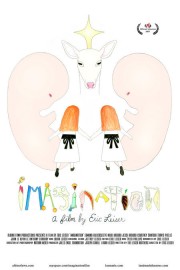imagination
In “imagination”, Sarah and Anna Woodruff (played by Jessi and Nikki Haddad, respectively) are twin sisters who confound everyone around them. Their father is distant and eventually leaves the family. Their mother (Courtney Sanford) is anxious and frantic for answers. And a child neurologist (Ed K. Gildersleeve) who initially diagnosed Anna with a rare form of autism isn’t so sure. Sarah- who’s near blind- and Anna live within their own world, a shared imagination that includes prophetic dreams and visions. They are almost the same person in a way, occasionally speaking in unison, rarely separated from one another. When tragedy strikes, the doctor is left with more questions than answers.
I’ll admit to being a little confused as to what the film is about. What I can clearly state is that it is a representation of the closeness some siblings- and twins in particular- share with one another (something I would imagine Eric Leiser, who directed the film and co-wrote the screenplay with his brother/composer Jeffrey, knows much about). At first I thought we might be watching an exploration into the gifted minds of the two sisters, and how their respective disabilities work to enhance such gifts, which in itself would be an interesting story. After a while, however, the film seemed to morph into a look inwards at how faith guides us into our eventual destination in life, and while that may be the best description I can give of the film, it doesn’t account necessarily for the almost supernatural aspect of the film, as evident in both the storytelling method and the ambiguous ending.
One of the things that struck me as particular inspired about the film was how well Leiser didn’t allow the obvious budgetary limitations get in the way of telling the story as best he could (it helps that he gets an assist from his brother Jeffrey on the music, which helps propel the narrative forward, even if it’s not terribly subtle). In a way, the film benefits from the limitations, using low-budget effects like high-speed photography, stop-motion animation, and photographic and sound effects to put us very much in Sarah and Anna’s world. (Of particular note is how Leiser makes us feel, convincingly, that an earthquake is taking place through simple camera and sound tricks.) Many times the film reminded me of Michel Gondry’s lovely “The Science of Sleep” from last year in such touches, and although it isn’t on solid enough ground thematically to compare to that film in overall quality, it does make for a distinctly endearing quality that will benefit the film on multiple viewings.
This is my first experience with Leiser’s work- he’s an established veteran of a couple of features now and many shorts in the independent film community- and was, on the whole, impressed by what I saw in “imagination” (he emailed me recently in the interest of getting a review from the site). His film- which has played at a few festivals and has video distribution lined up for a February 2008 DVD release- is a thoughtful and imaginative work, and will play well for anyone looking for something beyond the usual by-the-numbers explorations at the mysteries of life, even if I wasn’t completely clear as to what the film’s final point was.










